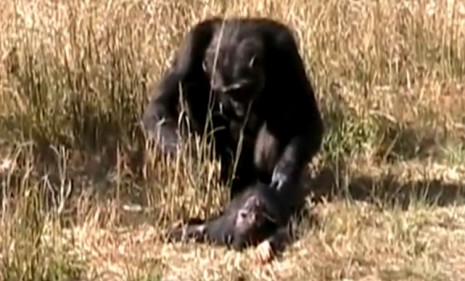How chimps mourn their dead
A touching video of an ape mourning her dead infant reveals that some simians grieve the way humans do

A free daily email with the biggest news stories of the day – and the best features from TheWeek.com
You are now subscribed
Your newsletter sign-up was successful
The video: A video showing how a chimpanzee responds to the death of her 16-month-old baby provides a fresh and moving glimpse at "just how similar chimps and other great apes are to humans," says The Telegraph. As part of a study exploring how the simians cope with mortality, four researchers from the Max Planck Institute for Psycholinguistics videotaped the chimpanzee mother as she processed her loss. In the video, shot at a Zambian wildlife orphanage, the mother carries the body for a full 24 hours after the infant's death. She then lays it on the ground, watches it from a distance, prods it to verify that it is lifeless, and consults a group of other chimpanzees for "a second opinion." A day later, she abandons the body and moves on.
The reaction: Scientists have known for some time that "chimpanzee mothers establish close physical relationships with their young, carrying them for up to two years and nursing them until they are 6," says The Daily Mail. But this latest look at how chimps process death, in the words of study leader Katherine Cronin, provides "unique insights" into "one of humans' closest primate relatives." Professor Mark Bodamer, who contributed to the study, tells The Telegraph that the findings will "contribute to a small but growing body of data on how non-human primates" learn about and respond to death. "Whether a viewer ultimately decides that the chimpanzee is mourning, or simply curious about the corpse," Cronin says, "is not nearly as important as people taking a moment to consider the possibilities." Watch the grieving chimpanzee below:
A free daily email with the biggest news stories of the day – and the best features from TheWeek.com
The Week
Escape your echo chamber. Get the facts behind the news, plus analysis from multiple perspectives.

Sign up for The Week's Free Newsletters
From our morning news briefing to a weekly Good News Newsletter, get the best of The Week delivered directly to your inbox.
From our morning news briefing to a weekly Good News Newsletter, get the best of The Week delivered directly to your inbox.
-
 The environmental cost of GLP-1s
The environmental cost of GLP-1sThe explainer Producing the drugs is a dirty process
-
 Greenland’s capital becomes ground zero for the country’s diplomatic straits
Greenland’s capital becomes ground zero for the country’s diplomatic straitsIN THE SPOTLIGHT A flurry of new consular activity in Nuuk shows how important Greenland has become to Europeans’ anxiety about American imperialism
-
 ‘This is something that happens all too often’
‘This is something that happens all too often’Instant Opinion Opinion, comment and editorials of the day